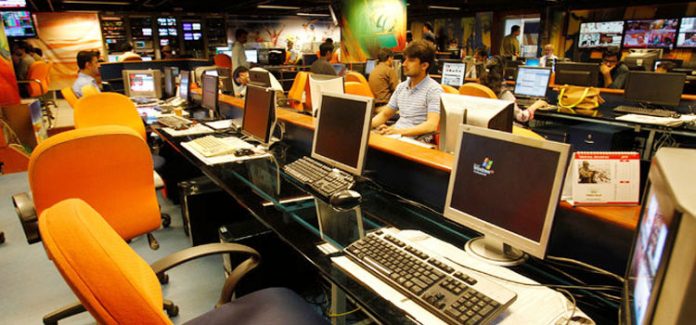LAHORE: Indian IT outsourcing industry juggernaut is being undercut by a resurgent Pakistan as over 125 people lost their jobs in a US-based IT service provider in Noida, New Delhi at end of October.
In an ironic twist, the day these 125 employees were sacked in Noida, almost a similar number of people logged into their systems 676 km away in Islamabad, reported Outlook India.
According to the report, rumours of layoffs had been humming over the last few months and the company was opening offices in a neighbouring country. The salaries of these sacked employees were said to be delayed by a day, which was attributed to a server issue and the following day 125 people were sacked in half-an hour.
The Indian IT sector known for its dominance has been plagued by job cuts for two years and have exacerbated to serious levels since start of 2017. The tide of IT jobs shifting to Pakistan is an emerging trend, said Outlook India.
The report warned besides border skirmishes and tensions between the two countries, it is low-end IT jobs which are under threat being taken away by Pakistan could really damage India.
Pakistan’s IT industry is experiencing a resurgence, as startup culture develops and budding entrepreneurs keen to exploit availability of 3G/4G services thrive under a conducive environment. It is keen to replicate the Indian IT industry’s model, which is feasible thanks to BPO callers and data operators being cheaper.
Outlook India believes China is doing the same to Pakistan’s IT industry to what US did to India’s IT sector two decades ago and significant investment under China-Pakistan Economic Corridor (CPEC) seems to be doing precisely that.
In May, e-commerce behemoth Alibaba inked an agreement with Pakistan government to collaborate on various fronts in IT sector and will reportedly invest $400 million to prop up its e-commerce segment. Freelancer.com states Pakistan is among top three countries in terms of software freelancers on its website.
Telenor invested over $3.5 billion in country’s telecom sector during last twelve years and with rising 3G/4G data consumption that figure will increase further. Earlier this year, PTCL and China Telecom Global (CTG) signed an agreement to lay optic fiber networks in Pakistan.
Secretary General of Pakistan Software Houses Association (PASHA), Shehryar Hydri said to Outlook India that around 10,000 IT graduates are entering Pakistan’s job-market annually and industry is valued at a touch over $3 billion which is nothing compared to India.
Hydri added “We have about 1,50,000 mainstream techies and between 1,50,000 and 2,00,000 freelancers but the number is expected to almost double if you take the non-tech freelancers into account.”
According to Executive Director Arshad Ali of Higher Education Commission of Pakistan (HECP), the country has a significant edge in English language proficiency and all graduates of the country are adept at speaking it. Ali said the number of institutes offering technical education had doubled over the last decade and “Now there are 188 universities offering IT programs.”
And language database Ethnologue says over 17 crore Pakistani’s can speak the English language. As per United Nations Population Fund report stated over 58.5 million out of 200 million Pakistani’s are in age bracket of 20 to 24 years, whereas 69 million under 15 years of age.
Outlook India stated considering current trends, most of these youngers would be interested in entering the IT industry. Although the article cited that the numbers game was fully in India’s favour and it would take a lot of time for Pakistan to catch-up.
A United Nations Population Fund report says that 58.5 million out of the total 200 million Pakistanis are between 20 and 24 years with 69 million under 15. Current trends indicate that more and more from this pool of youngsters will be inclined to join the IT industry.
But a US-based consultant Debojyoti Das in a statement to Outlook India said Pakistan’s political instability could deter companies from investing in the country. Das believes following a consumer backlash in US over learning they were talking to executives in Pakistan and India, had led to an initiation of in-sourcing.
Hydri added “I think it’s obvious, given that we love to hate each other, even 125 jobs going from India to Pakistan is seen as a threat.” He says it’s actually “a back-handed compliment to your own industry. Your guys have moved out of BPO outsourcing and up the food chain. In terms of IT maturity, we are five to ten years behind India.”





GREAT PERFORMANCE OF IT – INFORMATION TECHNOLOGY SECTOR IN PAKISTAN.
Great initiative